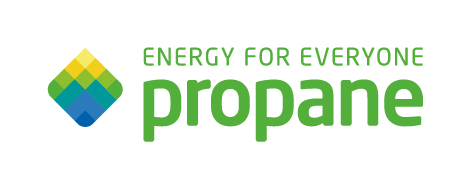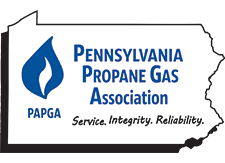
Residential Construction | Remodeling
Learn More: Build with Propane Guide
Efficient Energy
There are a few fundamentals you and your clients should know about propane:
It’s clean energy.
Propane emits significantly less CO2 compared to electricity for key residential applications like water heating.
That is because about 30 percent of the electricity in the U.S. is produced by coal-fired power plants. For example, a typical electric storage tank water heater can have emissions two-and-a-half times higher than those of a propane tankless system. The reduction in CO2 emissions from using a propane tankless water heater over its lifespan is equivalent to switching 432 incandescent light bulbs to CFLs. Propane systems can even help to earn points under green building programs like LEED for Homes and the National Green Building Standard.
It reduces energy costs.
Propane appliances are typically far more efficient than their electric counterparts.
For example, propane tankless water heaters can be up to 34 percent more energy-efficient than conventional storage water heaters in homes that have moderate hot-water use. High-efficiency propane furnaces offer best-in-class efficiency, with ratings of 98 annual fuel utilization efficiency (AFUE) now available. That 98 percent efficiency means big savings on heating bills for homeowners, coupled with an affordable installation cost for the heating system.
It supports modern lifestyles.
Propane provides your customers with the ability to choose first-rate amenities regardless of where they live.
Propane space heating is available in both forced-air and radiant systems that can be zoned for individual room comfort. And propane standby generators can provide peace of mind and security for customers in locations that experience rolling blackouts or storm-related power outages.
It’s builder-friendly.
With propane, you’re not at the mercy of a public utility.
Propane professionals can install properly sized propane storage and connect home appliances and other applications on your build schedule. Storage tanks can be placed aboveground or buried underground, and large community propane systems can even be designed to fuel an entire development. Propane also provides jobsite flexibility by providing gas energy for portable generators and temporary construction heaters.
Reliable and Safe
Why are more of your new-home construction and remodeling peers telling customers about the benefits of propane? Consider the following:
It’s domestically produced.
Propane is an efficient, clean byproduct of oil refining and natural gas processing. Propane is made in America, and a transportation network that includes pipelines, rail, and trucks distributes it to retailer distribution points across the country. Propane’s reach goes well beyond that of natural gas, whose limited infrastructure is costly to expand. That makes propane a readily available and affordable domestic gas energy source that contributes to U.S. jobs, economic growth, and energy security.
It’s designed for safety.
Typically used in gas form, propane is stored and transported as a liquid under pressure. Propane is nontoxic and odorless, so processors add a chemical odorant (ethyl mercaptan) to help users detect leaks by way of an easy-to-identify rotten-egg smell.
It’s installed by pros with top-quality training.
The propane industry’s voluntary Certified Employee Training Program (CETP) helps ensure that propane installation and service personnel are well qualified to handle even the most challenging tasks. In addition, propane is a well-regulated industry that follows the codes and standards set by the National Fire Protection Association (NFPA), the Department of Transportation, the Department of Energy, and various state and local regulatory bodies. For more information, go to Propane.com/Safety.
The Propane Home
Propane offers a whole-home energy upgrade that delivers superior comfort and efficiency compared with all-electric homes. Using high-efficiency propane gas appliances for major applications provides optimal energy performance unmatched by electric alternatives. For a competitive advantage in home performance, comfort, and efficiency, build your propane homes with these five applications.
– Space Heating: Cost-efficient heating with a more comfortable and consistent warmth.
– Water Heating: Higher hot-water flow rates and lower cost of ownership compared with electric options.
– Cooking: The joy and control of cooking with gas, just like the professionals do.
– Clothes Drying: Faster drying with all the high-performance features you’re looking for.
– Fireplaces: All of the pleasures of a real fire with none of the hassles of wood.
Key Benefits of All-Propane Homes
Efficient Systems: Propane powers highly efficient appliances for a home’s most important energy applications. This means you can meet your most demanding customers’ expectations with style and ease.
Green Profile: When chosen in place of heating oil or electricity, propane lowers a home’s overall carbon footprint — often the equivalent of a car’s emissions for a year.
Energy Rebates: Installing propane enables your customers to reap maximum benefits from any available federal, state, and local energy rebate and tax credit programs. And builders and remodelers can earn up to $1,500 per home with the Propane Construction Incentive Program.
On-Site Energy: When your customers choose propane appliances, they can claim a unique feature: Clean, reliable energy that’s on site. That’s especially true if a customer chooses to add a propane standby generator, which protects them from unexpected power outages.
Keeping Score: All-Propane vs. Standard Homes
Newport Partners LLC, an independent third-party research firm, conducted careful modeling analysis of the Home Energy Rating System (HERS) Index for two homes — one built with standard appliances and systems, and one built with a 95-percent-efficient propane furnace, a 0.95 Energy Factor propane tankless water heater, and Energy Star propane kitchen and laundry appliances. In its analysis, propane homes achieved significant HERS Index improvements over the standard home.
| 3,600-SQUARE-FOOT HOME (COLD CLIMATE) | PROPANE HOME | STANDARD HOME |
|---|---|---|
| Home Energy Rating System (HERS) Index* | 47 | 60 |
*The lower the score, the more efficient the home.
Use the Home Energy Rating System to Gain Referrals
If you’re looking for a new way to showcase the value of your home construction over competitors’, consider applying the Home Energy Rating System (HERS) to your projects. Developed by the Residential Energy Services Network (RESNET), the HERS Index can be used to compare a Propane Energy Pod home with a built-to-code reference home. The index also allows comparisons of different home designs and specifications. The HERS measure works across climate zones and is used by builders and remodelers to differentiate their high-performance homes from standard new and existing homes.
To try the interactive Virtual Propane Home, which shows HERS Index ratings of propane homes across the U.S., go to Propane.com/Interactive-Training-Module.
Download the Build with Propane Guide
For more information download the Build With Propane Guide.

Manufactured | Factory Built Homes
Watch: A showcase for modern and efficient manufactured housing
As HUD looks to manufactured housing as a shortage solution, a 77-home community in rural Maine shows the housing type’s potential.
HUD is proposing a sweeping set of changes to its Manufactured Home Construction and Safety Standards. The updates will pave the way for manufacturers to take more modern design approaches to position manufactured homes as a partial solution to the current affordable-housing shortage.
“Manufactured homes are an important element of the nation’s affordable housing supply,” Julia Gordon, assistant secretary for housing and federal housing commissioner, said in a statement. “These proposed updates, when final, will help to expand the availability of safe and affordable homes that align with current design trends and construction methods.”
When the updates go into effect, manufactured housing could nearly be indistinguishable from site-built homes. HUD’s changes will allow for open floorplans, ridge roof designs, accessibility improvements, and higher-end materials that could help make these housing units an attractive and affordable alternative to conventional homes.
HUD makes way for tankless
Also included in the changes: gas-fired tankless water heaters. For years, if housing manufacturers wanted to include tankless units, they’d need to request HUD approval through an “alternative construction” letter outlining a number of compliance points. Now, tankless water heaters could become commonplace — if not standard — in pre-fab homes. It’s a welcome change as the manufactured housing industry strives for energy efficiency.
“The idea to have on-demand tankless water heaters in these homes is, far and away, the best thing that’s happened to this industry,” says Mark Phillips, owner and developer of Blackberry Hill Village, a new 55+ community in Berwick, Maine, just over the New Hampshire border.
In many ways, Phillips’ project is right in line with HUD’s efforts to modernize and gain wider consumer acceptance of manufactured housing. The double-wide homes have 5/12 pitched roofs, concrete foundation crawl spaces, and two-car garages. Inside, you’ll find many of the accoutrements of a custom home: crown and window molding, soft-closing cabinets, and stainless-steel appliances.
When complete, Blackberry Hill Village will feature 77 manufactured homes on 73 acres, bringing much-needed housing to the coastal community.
“Demand has always exceeded supply for several years here in the seacoast,” Phillips says. “The problem today is the product is limited, inventory is limited, and prices are high.”
Propane powers manufactured homes
Energy efficiency was a priority, Phillips says. The units come from Pine Grove Homes, which earned the 2022 Market Leader Award from Energy Star, signifying they’re at least 10 percent more efficient than those built to code. The homes feature Energy Star–rated windows and appliances, R38 insulation in the ceiling, R21 in the walls, and R19 in the belly. Each home is equipped with twin propane tanks, from Eastern Propane, to power the gas cooktop, furnace, outdoor grill, and optional fireplace. Compared with oil, it’s a cheaper, cleaner fuel source. Propane, Phillips says, was preferable to going all electric, too.
“All electric would be problematic,” he says, citing skyrocketing electricity rates. Phillips also likes that residents can shop around for a propane supplier if they so choose. “With propane, you’re dealing with an open and competitive market. You can choose who you want to do business with.”
Plus, residents with propane-fueled fireplaces will have an alternate heat source if the electricity goes out, he adds.
Because the market for Blackberry Hill Village is primarily retirees, Phillips wants residents to feel comfortable aging in place. That’s why the homes include accessibility features such as door levers (instead of hard-to-handle knobs), grab bars in the main suite’s bathroom, and raised toilets. Being on a sunken foundation also eliminates the need for multiple steps to the entrance.
Residents won’t have to mow their lawns, take out the trash, or clear the snow, either. Blackberry Hill Village takes care of all that.
Phillips says, “The whole idea here is to make it as convenient as possible for the residents.”
For more information on Factory Built Homes visit PA Manufactured Housing Association’s website.

 Mower Equipment
Mower Equipment